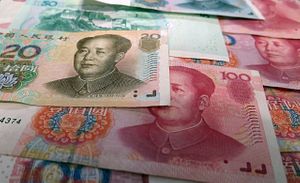Although not widely reported, China’s currency, the renminbi (RMB), has gradually penetrated Indonesia.
It is reported that currently around 10 percent of Indonesia’s global trade uses the RMB. In 2018, the value of clearing RMB reached 201.2 billion RMB, or about 63 percent of the entire Indonesian market. Bank of China ranked first in Indonesia’s market share in clearing value.
A report by the Society for Worldwide Interbank Financial Telecommunication (SWIFT) also found that in 2017 215 billion RMB was circulating in Indonesia.
The growing internationalization of the RMB is, among other factors, helped by the expanding economic ties between Jakarta and Beijing. At the moment, China is Indonesia’s largest trading partner, with trade two time that of Indonesia and the United States. A large amount of investments from China have also made their way to the archipelago, in particular with the implementation of the Belt and Road Initiatives (BRI).
Chinese companies in Indonesia have also begun to use RMB. For example, PT China Life Insurance Indonesia (CLII) launched the first individual multipurpose life insurance product in RMB, known as CLII Privilege Insurance Plan, in the Indonesian life insurance market. CLII stated that the move was part of the strategy of its parent company, China Life Insurance Group, to support the RMB internationalization process.
A number of Chinese banks, such as Bank of China and Industrial and Commercial Bank of China (ICBC), have also established branches in Indonesia. These banks help widen the use of the RMB in Indonesia through mechanisms such as RMB cross border trade settlements, RMB prefix remittances, and RMB domestic and cross border fund transfers. In addition, the banks also offer various banking products and services to corporations, small and medium enterprises, and individuals through 19 branches in Indonesia.
In addition, the Chinese banks have also partnered with local banks to help RMB internationalization in Indonesia. For instance, the ICBC has collaborated with Bank Mandiri to provide banking products and services related to RMB transactions. As a result of the collaboration, in early 2018 RMB transactions facilitated by Bank Mandiri Group totaled around 507 items worth 601 million RMB.
The widening use of RMB in Indonesia cannot be separated from the Bilateral Currency Swap Agreement (BCSA), signed by Bank Indonesia with the Bank of China in 2018. The deal was worth 200 billion RMB, $30 billion at the time, doubling the previous threshold of 100 billion RMB. The agreement was signed to enable trade transactions using both countries’ currencies, which can shorten and simplify business transactions compared to using international trade currencies or hard currencies such as the U.S. dollar, where each country needs to exchange their currencies to dollars first.
Previously, Bank Indonesia has also signed similar agreements with Japan and European Union.
Although renminbi bonds in Indonesia remain limited (under 1 percent), the growing use of RMB in Indonesia-China trade transactions will likely lead Indonesia to issue RMB-denominated sovereign debt. The Indonesian Ministry of Finance has admitted that it is currently studying the possibility of issuing RMB-denominated government securities (SBN). The instrument, commonly referred to as Panda Bonds, will increase Indonesia’s foreign currency bonds, which has so far only been in U.S. dollars, euros, and Japanese yen. Several other countries have used Panda Bonds as a source of budget financing, including the Philippines and Poland.
Policy discussions on the use of RMB have also been held with Indonesian policymakers and academics. The Bank of China in Jakarta, for example, cooperated with Foreign Policy Community Indonesia (FPCI) to hold the FPCI – BOC CFO Forum 2019 on “Understanding the Growing Role of Chinese Renminbi in International Business” in Jakarta.
The widening use of the RMB in Indonesia is likely to increase in the coming years. This may be made possible by the continuing implementation of the BRI and the recent introduction of Digital Currency Electronic Payment (DCEP), or known as digital renminbi (e-RMB), by the Bank of China, which will facilitate online payments. Such online systems have only increased in popularity due to COVID-19.
More importantly, Indonesia sees the opportunity in the RMB.
As affirmed by Dino Patti Djalal, a former Indonesian ambassador to the United States and the founder of FPCI, the use of the RMB as a currency in international trade transactions has a number of advantages for Indonesia. One of them is that the RMB is more stable compared to the U.S. dollar, which easily fluctuates against other countries’ currencies. Thus, in terms of transaction costs, China’s currency is cheaper and safer. Not only that, the use of RMB can also reduce risk.
Another reason why the use of Chinese currency will increase in Indonesia is because Jakarta sees China as one of the countries with the greatest capital adequacy in the world. Indonesia needs foreign capital and can certainly take advantage of these opportunities by opening the door wider for the RMB. President Joko “Jokowi” Widodo has even put forward the idea of making the RMB a reference currency.
In spite of this, Indonesia has some homework to do.
The growing flow of capital from China should not make Indonesia allow Beijing to dictate terms. China must continue to follow the rules of the game set by Indonesia. This is to make sure that the widening use of the RMB does not only benefit China, but both parties.
Moreover, Indonesia also needs to encourage relevant actors to begin opening up for the use of the RMB in their operations. As reported, the most crucial obstacle for the widening use of the RMB comes from business actors, who have no confidence yet to use the currency in business transactions. It is crucial on the part of Indonesia to change the mindset of businesspeople in both countries so that the RMB can be used more widely.
Dr. Muhammad Zulfikar Rakhmat is a senior lecturer at Universitas Islam Indonesia.

































